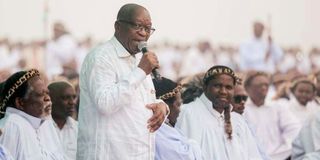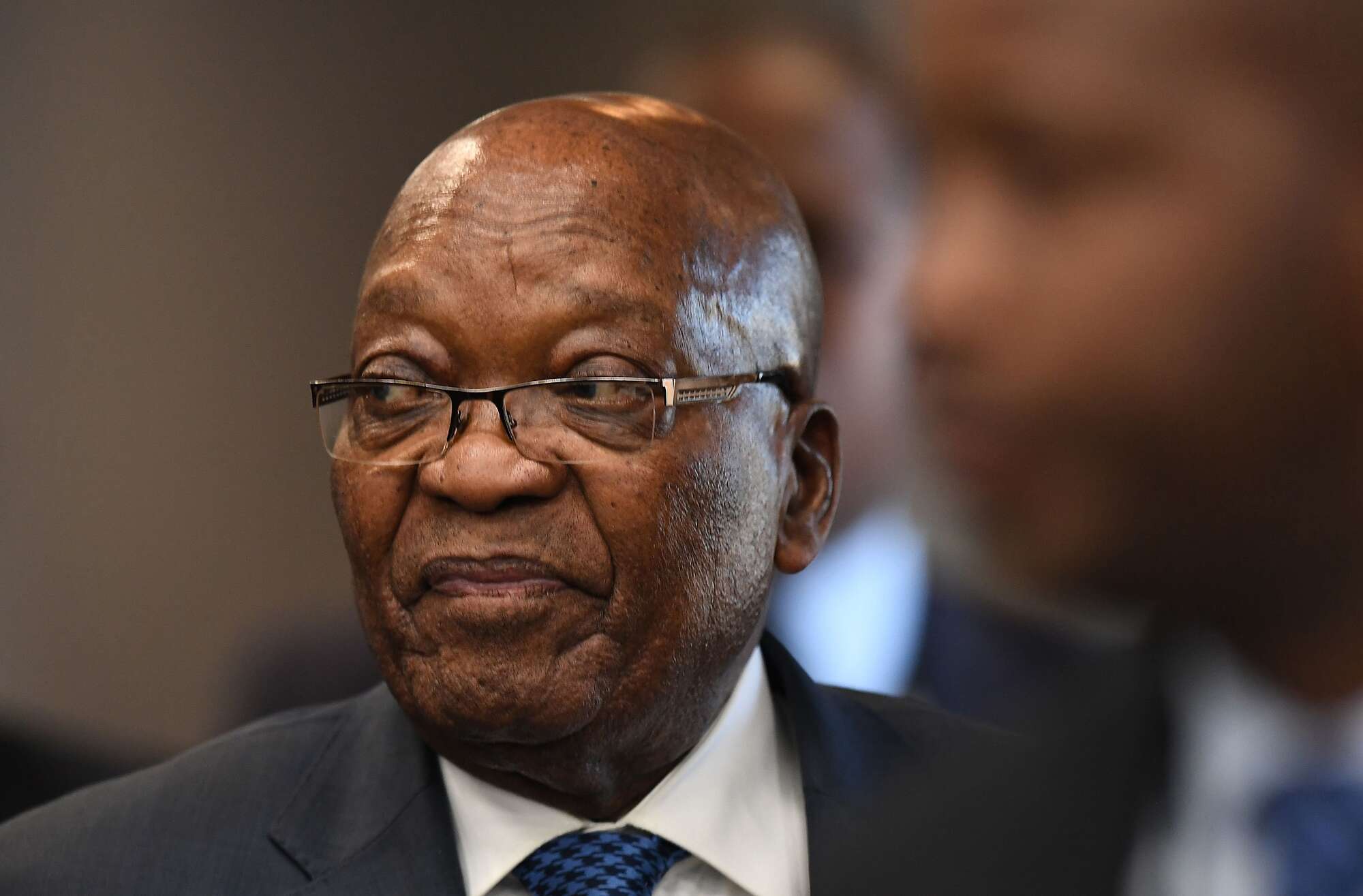Zuma’s hydra head returns to disrupt old beloved ANC

Former President Jacob Zuma addresses followers during a church service on the Canaan Holy Mountain in Ndwedwe near Durban, South Africa on January 13, 2024.
What you need to know:
- ANC’s internal poll showed it was able to garner about 48 per cent of the total vote
- Independent pollsters have put the ANC on even lower numbers, sometimes as low as 38 per cent.
South Africa’s post-apartheid ruling party, the African National Congress (ANC) is facing its most daunting elections yet. But perhaps its ex-stalwart and former President Jacob Zuma may be the part-mastermind.
Even before the recent formation of a directly competing political party, uMkhonto we Sizwe (Spear of the Nation, or MK), which was the name of ANC’s armed wing, the ANC’s internal poll showed it was able to garner about 48 per cent of the total vote expected in the next elections. MK naming may involve a legal battle as the ANC says it owns the name.
Independent pollsters have put the ANC on even lower numbers based on surveyed sentiment among likely voters, sometimes as low as 38 per cent.
And that was without counting the likely impact of Zuma’s new formation.
The latest research, undertaken by the NGO body, the Social Research Foundation (SRF), polled Zuma’s popularity in his home province of KwaZulu-Natal (KZN), just days before the still-popular politician announced his support for the newly formed MK party, in direct opposition to the ANC.
SRF chairman Dr Frans Cronje said the resulting data showed that the 81-year-old Zuma’s re-entry to the political playing field was potentially a “game changer” for the ANC, which he says is now in “panic mode”.
The ANC has responded to recent likely voter surveys, including its own, all showing that it was heading for poorer performance, by saying it was intent upon obtaining 51 per cent of the poll, come the May 29 national and provincial elections.
If Zuma’s MK party draws 10 per cent support nationally and around a quarter of the vote in KZN – primarily from ANC voting ranks, according to the SRF survey, the ruling party can no longer expect a post-election future where it retains power, even with the help of a smaller party or two.
Zuma was in January ruled by the Independent Electoral Commission (IEC) to be personally ineligible to appear on ballots, due to his 15-month jail term for contempt of the Constitutional Court’s orders in 2021. But this ruling does not impact MK’s ability to do so – although the ANC says it must stop using that name or face legal action.
But there is no doubt that Zuma is the leading light in what amounts to a major schism in the ANC, mostly made up of disgruntled former loyalists now focused on winning a narrower, mainly ethnically-aligned power base in KZN.
Former ANC high flyers who have been accused of corruption, such as ousted party secretary-general Ace Magashule, look set to also align themselves behind MK, making the formation all the more daunting for the ruling party.
In the financial heartland of Gauteng, where Zulus are to be found in significant numbers, Zuma is expected to draw similar levels of support from the largest ethnic grouping of some 12 million people, a fifth of the country’s estimated 61 million citizens.
Among the consequences for ‘the oldest liberation movement in Africa’ are likely to be loss of sole national power, as well as control of the Zulu homeland province and potentially other regions too, most notably Gauteng, where both Johannesburg and Pretoria are located and which are the commercial, manufacturing and administrative hubs of the country.
The ‘Zuma fracture’ is especially bad news for ANC in KZN, where Zuma remains very popular at 24 per cent support, as measured by the SRF.
The ANC recently suspended Zuma for openly supporting the MK party and is preparing to kick him out.
But that move will only cement the pro-Zuma support camp in opposition to the ANC, under which flag Zuma once vowed he would die for.
The likely loss of control of KZN to a consortium of opposition groups, with the ANC’s vote-share at likely around 25 per cent, says the SRF survey, is increased pressure for provincial secessions from a union imposed by the British colonial power in 1910.
In the Western Cape, which has been under the control of the official opposition Democratic Alliance (DA) since 2009, there have long been groups agitating for the secession of the province from the rest of the country.
The DA has already optimised the semi-federal political system of the country to minimise the reach of the central authorities in Pretoria into the Western Cape.
But with another province and the country’s largest ethnic grouping, the Zulus, seeking their ‘own homeland’, separate and apart from the rest of South Africa, the Western Cape push for secession looks set to take on additional steam.
Constitutional experts say there is no current pathway to ‘independence’ for any given province, but the ANC government simply does not have the power to force itself onto two key areas of the country, if the movement to secede continues to gain strength, as seems likely.
Polling conducted by independent research entity, Victory Research, for the Cape Independence Advocacy Group (CIAG) in the third quarter of last year, found that 62 per cent of ‘white’ people, 78 per cent of ‘coloured’ (mixed race) people, and 31 per cent of ‘black’ people in the Western Cape support ‘Cape independence’, politically.
Opponents of the cessation calls say that not only are there no constitutionally approved pathways to independence for any region, but that it may well lead to civil war, given that racial or ethnic elements are present in both cases.
Either way, recent by-election results tend to support the political surveys which show that a much-weakened ANC is headed to defeat at the forthcoming polls.
Zuma’s MK has already had an impact in by-elections, despite being the newest party in the country, by taking a significant slice of the vote in a Zululand by-election, eating into support for both a resurgent Zulu traditionalist formation, the Inkatha Freedom Party (IFP), and the ANC.
The unexpectedly good showing by MK has sent shock waves through both the IFP and the ANC, giving these established parties ‘a fright’ in the marginal IFP-held seat in uPhongolo, KwaZulu-Natal.
30 years on from its ascent to power, the ANC was already facing the twin threat of growing voter dissatisfaction across socio-economic lines and a loose coalition of opposition parties led by the DA, which is hoping to unseat the ruling party nationally, and regionally, where it has been in power since it ousted the authors of the race-based apartheid system in 1994.
The trend away from the ANC is clear from about a dozen by-elections held this year and last, with the ANC in most cases showing large drops, and the once-surging radical opposition Economic Freedom Fighters (EFF), also showing diminished support, in most cases.
The emergence of a major ‘threat from within’, especially in KZN and Gauteng, has presented the ANC with a much-diminished prospect for holding onto power, say political analysts such as SRF’s Dr Cronje.
Zuma, meanwhile, is still facing up to 15 years behind bars in an ongoing and long-running arms deal corruption case, dating from the late 1990s.




